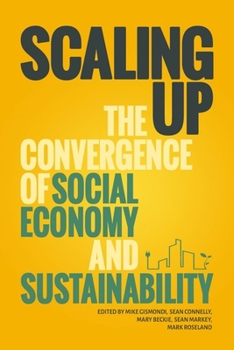Scaling Up: The Convergence of the Social Economy and Sustainability
When citizens take collaborative action to meet the needs of their community, they are participating in the social economy. Co-operatives, community-based social services, local nonprofit organizations, and charitable foundations are all examples of social economies that emphasize mutual benefit rather than the accumulation of profit. While such groups often participate in market-based activities to achieve their goals, they also pose an alternative to the capitalist market economy. Contributors to Scaling Up investigated innovative social economies in British Columbia and Alberta and discovered that achieving a social good through collective, grassroots enterprise resulted in a sustainable way of satisfying human needs that was also, by extension, environmentally responsible. As these case studies illustrate, organizations that are capable of harnessing the power of a social economy generally demonstrate a commitment to three outcomes: greater social justice, financial self-sufficiency, and environmental sustainability. Within the matrix of these three allied principles lie new strategic directions for the politics of sustainability.
Whether they were examining attainable and affordable housing initiatives, co-operative approaches to the provision of social services, local credit unions, farmers' markets, or community-owned power companies, the contributors found social economies providing solutions based on reciprocity and an understanding of how parts function within the whole--an understanding that is essential to sustainability. In these locally defined and controlled, democratically operated organizations we see possibilities for a more human economy that is capable of transforming the very social and technical systems that make our current way of life unsustainable.





